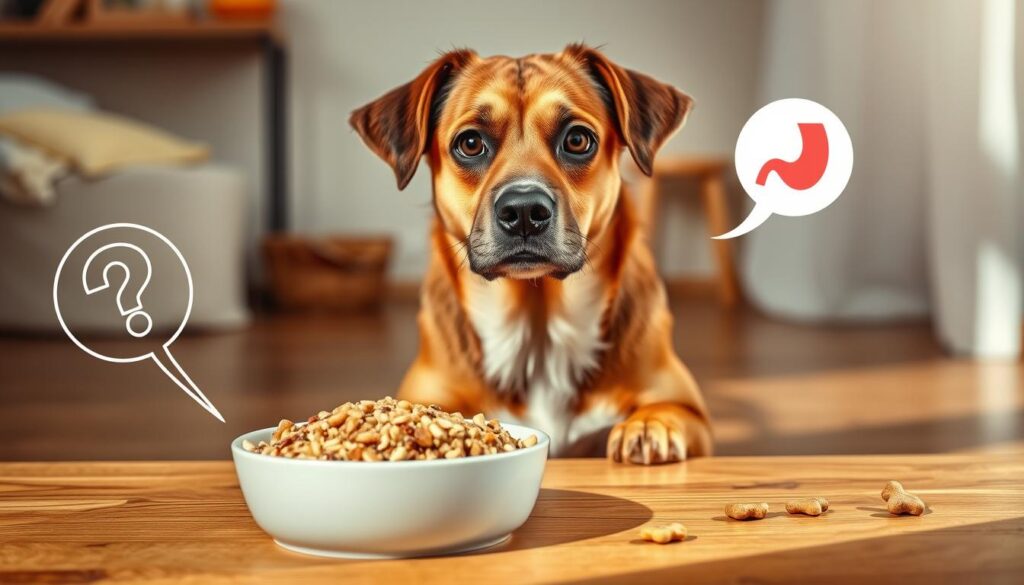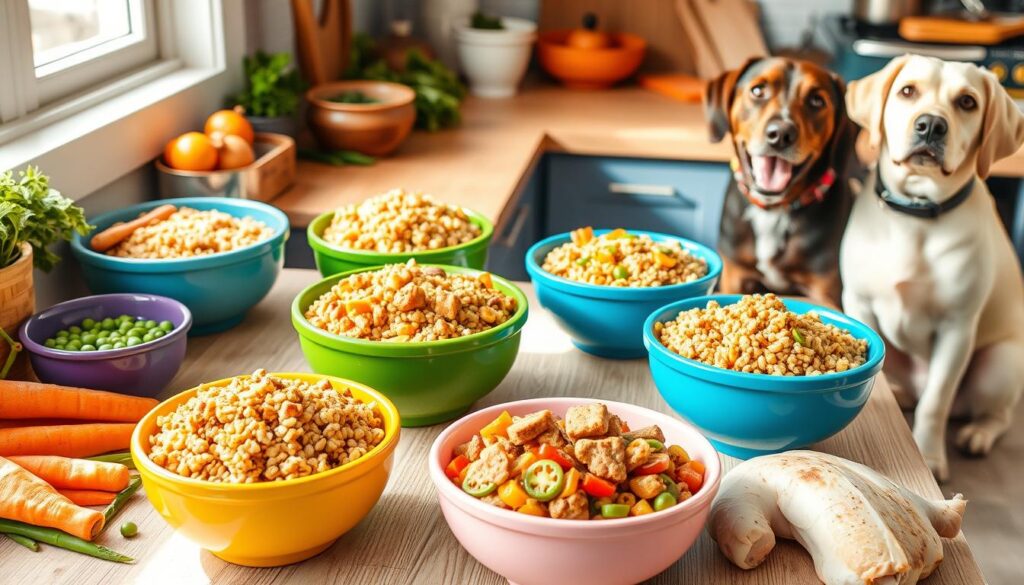As a devoted pet parent, you want the best for your dog. You might wonder if quinoa, a superfood for humans, is good for your dog too. The answer is mostly yes!
Quinoa is a nutritious pseudo-grain that’s safe and healthy for dogs. It’s packed with protein, fiber, vitamins, and minerals. These nutrients help your dog’s muscles, digestion, and overall health.
When adding quinoa to your dog’s diet, do it slowly and in the right amounts. Make sure to rinse and cook it well. This way, you can make quinoa a tasty and nutritious part of your dog’s meals.
Table of Contents
Understanding Quinoa: A Superfood Overview
Quinoa is a seed from the Chenopodium plant and is known as a “superfood.” It’s special because of its nutritional value. It has all nine essential amino acids, making it a complete protein. It’s also packed with fiber, vitamins, minerals, and antioxidants.
What Makes Quinoa a Superfood
Quinoa is truly a superfood. A study found that eating four servings of ancient grains daily can lower the risk of heart disease, cancer, and death. A 100-gram serving of cooked quinoa is full of protein, phosphorus, potassium, and fiber. It’s a great addition to any diet.
Nutritional Profile of Quinoa
Quinoa has an amazing nutritional profile. A 100-gram serving of cooked quinoa has:
- Protein: 4.4 grams
- Fiber: 2.8 grams
- Phosphorus: 172 milligrams
- Potassium: 318 milligrams
Types of Quinoa Available
There are many types of quinoa, each with its own traits. The most common ones are:
- White Quinoa: The most common and has a mild taste.
- Red Quinoa: Has a nuttier taste and chewier texture.
- Black Quinoa: The rarest, with a sweeter taste and crunchier texture.
Quinoa’s quinoa nutritional benefits and status as a quinoa superfood make it great for any diet. This includes our furry friends too.
Can Dogs Eat Quinoa: Safety and Suitability
It’s natural to wonder if quinoa is safe for our dogs. The good news is that quinoa can be a nutritious addition to a dog’s diet when introduced and fed properly.
Quinoa is gluten-free and rich in protein. It has all the amino acids dogs need. It’s also full of fiber, vitamins, and minerals like magnesium and B vitamins.
But, it’s key to introduce quinoa slowly and in small amounts. Too much can upset their diet and cause weight gain.
Make sure to rinse and cook quinoa well. Uncooked quinoa might irritate your dog’s stomach. Don’t add any spices or oils that could harm them.
Begin with a little quinoa and watch how your dog reacts. Some dogs might have trouble digesting it. If they show signs of upset stomach, stop giving them quinoa and talk to your vet.
In summary, quinoa can be a safe and nutritious choice for dogs if given in moderation. Always check with a vet before changing your dog’s diet to keep them healthy.
The Health Benefits of Quinoa for Dogs
Quinoa is great for our furry friends. It’s gluten-free and packed with nutrients. These help keep dogs healthy and happy.
Protein and Amino Acids
Quinoa is full of protein and amino acids. Dogs need these for strong muscles and growth. It’s perfect for active or growing dogs.
Fiber and Digestive Health
Quinoa’s fiber helps with digestion. It keeps bowels regular. This is good for dogs with sensitive stomachs or digestive problems.
Vitamins and Minerals
Quinoa has vitamins and minerals like magnesium, iron, and B vitamins. These support muscle and nerve health, blood cells, and energy. They help dogs stay healthy.
Adding quinoa to your dog’s food has many benefits for their health. It helps with muscle growth and keeps digestion regular. It’s a healthy choice for dogs.
Potential Risks and Considerations
While quinoa is safe for dogs, there are risks to think about. Some dogs might be allergic to quinoa, which is rare. Signs of quinoa allergies in dogs include itching, skin rashes, and stomach problems.
Quinoa has saponins, which can upset the stomach if not rinsed well. Eating too much quinoa can cause gas, bloating, or diarrhea because of its fiber.
Start with small amounts of quinoa to help your dog’s stomach get used to it. Always talk to a vet before adding quinoa to your dog’s diet. This ensures it’s right for their health and nutritional needs.

| Potential Risks | Mitigation Steps |
|---|---|
| Quinoa allergies in dogs | Monitor for signs of allergic reaction and discontinue use if observed |
| Saponin content | Thoroughly wash and cook quinoa before serving |
| Digestive issues (gas, bloating, diarrhea) | Introduce quinoa gradually and in moderation |
Safe Serving Sizes for Different Dog Breeds
Adding quinoa to your dog’s diet needs careful thought. You must consider the right serving size for your dog’s breed and size. This ensures your dog gets the good stuff from quinoa without any bad side effects.
Small Dog Portions
Small dogs, which weigh 2-20 pounds, should get only a tablespoon or less of cooked quinoa each day. Start with a small amount and see how your dog does. If they can handle it, you can give them a bit more.
Medium Dog Portions
Medium-sized dogs, which are 31-50 pounds, can have up to 1/4 cup of cooked quinoa daily. Just like with small dogs, start slow and watch for any signs of trouble.
Large Dog Portions
Big dogs, 51-90 pounds, can have up to 1/3 cup of cooked quinoa each day. Dogs over 91 pounds can have up to 1/2 cup of quinoa daily.
Remember to introduce quinoa slowly and watch your dog’s reaction. Some dogs might be more sensitive than others. If you notice any upset stomach or allergic reactions, talk to your vet. They can help figure out the right quinoa serving size for your dog.
How to Prepare Quinoa for Your Dog
Quinoa is a superfood that can be a healthy addition to your dog’s diet. Start by rinsing the grains well to remove saponins. These compounds can upset your dog’s stomach. Then, cook the quinoa in plain water without any seasonings, oils, or additives.
Once the quinoa is cooked and cooled, you can mix small amounts into your dog’s regular food. Or, use it as a nutritious topper. But, don’t add any extra ingredients that could harm dogs, like garlic, onions, or too much salt. It’s best to prepare the quinoa separately for your pup, without the spices and seasonings you might use for human consumption.
- Rinse the quinoa under running water to remove saponins.
- Cook the quinoa in plain water, without any seasonings or additives.
- Allow the quinoa to cool completely before serving to your dog.
- Mix small amounts of the cooked quinoa into your dog’s regular food.
- Alternatively, you can use the quinoa as a healthy topper for your dog’s meals.

By following these simple steps, you can safely add quinoa to your dog’s diet. This will give them a nutritious, how to cook quinoa for dogs boost. Always talk to your vet before making big changes to your pet’s food routine.
Signs of Quinoa Allergies in Dogs
Quinoa allergies in dogs are rare but can happen. Knowing the signs is key. Look out for itching, skin rashes, vomiting, diarrhea, and too much paw licking.
Common Allergic Reactions
If your dog shows these signs after eating quinoa, stop it right away. Allergic reactions can be mild or serious. Watch your dog closely. Severe symptoms like trouble breathing, non-stop vomiting, or diarrhea need vet help fast.
When to Contact Your Vet
Quinoa is usually safe for dogs, but be careful. Start with small amounts and watch your dog. If you’re worried or see symptoms get worse, call your vet. They can help with quinoa allergies in dogs and keep your pet healthy.
Incorporating Quinoa into Your Dog’s Diet
Quinoa, an ancient Andean superfood, is great for your dog’s diet. It’s gluten-free and packed with benefits. It helps with muscle growth and keeps your dog’s digestive system healthy. Learn more about the quinoa dog diet here.
To add quinoa to your dog’s meals, start with a small amount. Mix it with their regular dog food. Slowly increase the amount over a few days. Watch how your dog reacts.
Quinoa can be a tasty topper, mixed with veggies, or a special treat. But, don’t let it make up more than 10% of their diet. A balanced diet is key for your dog’s health. Always talk to your vet before changing your dog’s diet.
Quinoa Dog Food Recipes
Get creative with quinoa in your dog’s meals. Here are some ideas:
- Mix cooked quinoa with shredded chicken, steamed carrots, and parsley for a tasty dish.
- Make a quinoa and sweet potato casserole with low-sodium broth for a moist meal.
- Make quinoa and peanut butter treats with natural peanut butter and honey for a protein-rich snack.
| Quinoa Serving Size for Different Dog Breeds | Small Dogs | Medium Dogs | Large Dogs |
|---|---|---|---|
| Recommended Daily Serving | 1-2 tablespoons | 2-3 tablespoons | 3-4 tablespoons |
Introduce quinoa slowly and watch for any reactions. If you’re unsure, ask your vet about adding quinoa to your dog’s diet.
Alternative Healthy Grains for Dogs
While quinoa is a nutritious option, there are other healthy grains for dogs to try. These include:
- Brown Rice
- Oatmeal
- Barley
- Millet
These healthy grains bring different nutritional benefits. They can add variety to your dog’s diet. Just like quinoa, cook them plain and introduce them slowly. Always think about your dog’s specific needs and health before adding new grains.
Brown rice is full of complex carbs and fiber for digestion. Oatmeal has soluble fiber to help control blood sugar. Barley is rich in vitamins and minerals. Millet is gluten-free and easy to digest.
By mixing different healthy grains for dogs into their meals, you can give them a balanced diet. This way, your pup gets to enjoy the benefits of these dog-friendly grains.
Quinoa vs Traditional Dog Food Ingredients
Quinoa is often seen as a better choice for dog food than rice or corn. It’s packed with nutrients that are great for dogs.
Nutritional Comparison
Quinoa has a better nutritional profile than many dog food grains. It’s a complete protein, meaning it has all the amino acids dogs need. It also has more fiber, vitamins, and minerals like B vitamins, E, iron, magnesium, and potassium.
Rice and corn, on the other hand, have less protein and fewer nutrients than quinoa. While they can be part of a good diet, quinoa is more nutritious.
Cost Considerations
Quinoa is pricier than usual dog food grains. But, its extra nutritional value might be worth the cost for some owners.
Remember, a good dog food already has all the nutrients your dog needs. Quinoa can be a good addition, but it shouldn’t be the only thing your dog eats. Think about the costs and benefits before adding quinoa to your dog’s diet.
Conclusion
Quinoa can be a safe and healthy choice for your dog’s meals if done right. It’s packed with protein, fiber, and vitamins that can help your dog stay healthy. But, it’s important to introduce it slowly and watch for any signs of trouble.
Quinoa should be a part of a balanced diet, not the only thing your dog eats. Always talk to your vet before changing your dog’s food to make sure it’s safe and good for them.
Adding quinoa to your dog’s diet can be a great way to give them a nutritious meal. Just remember to do it in small amounts and always think about your dog’s health first. With care, quinoa can be a great addition to your dog’s meals.
Quinoa is a good choice for pet owners who want to improve their dog’s health. With your vet’s help, you can add quinoa to your dog’s diet safely. This will help keep your dog happy and healthy.

